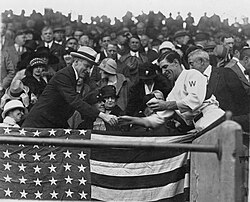
Back سلسله العالم 1924 ARZ Serie Mundial de 1924 Spanish World Series 1924 Italian 1924年のワールドシリーズ Japanese 1924年世界大賽 Chinese
| 1924 World Series | ||||||||||
|---|---|---|---|---|---|---|---|---|---|---|
 Washington manager Bucky Harris presents U.S. President Calvin Coolidge with the baseball used to open the 1924 World Series. | ||||||||||
| ||||||||||
| Dates | October 4–10 | |||||||||
| Venue | Griffith Stadium (Washington) Polo Grounds (New York) | |||||||||
| Umpires | Tommy Connolly (AL), Bill Klem (NL) Bill Dinneen (AL), Ernie Quigley (NL) | |||||||||
| Hall of Famers | Umpires: Tommy Connolly Bill Klem Senators: Goose Goslin Bucky Harris (2B/manager) Walter Johnson Sam Rice Giants: John McGraw (manager) Frankie Frisch Travis Jackson George Kelly Freddie Lindstrom Billy Southworth‡ Bill Terry Hack Wilson Ross Youngs ‡ Elected as a manager | |||||||||
| Broadcast | ||||||||||
| Radio | Westinghouse | |||||||||
| Radio announcers | Graham McNamee | |||||||||
| ||||||||||
The 1924 World Series was the championship series of the 1924 Major League Baseball season. A best-of-seven playoff, the series was played between the American League (AL) pennant winner Washington Senators and the National League (NL) pennant winner New York Giants. The Senators defeated the Giants in seven games to win their first championship in club history. The Giants became the first team to play in four consecutive World Series, winning in 1921–1922 and losing in 1923–1924. Their long-time manager, John McGraw, made his ninth and final World Series appearance in 1924. The contest concluded with the second World Series-deciding game which ran to extra innings (the first had occurred in 1912). In 1961, the Senators relocated to Minnesota and were rebranded as the Twins, subsequently winning the World Series in 1987 and in 1991.
Walter Johnson, after pitching his first 20-victory season (23) since 1919, was making his first World Series appearance, at the age of 36, while nearing the end of his career with the Senators. He lost his two starts, but the Senators battled back to force a Game 7, giving Johnson a chance to redeem himself when he came on in relief in that game. Johnson held on to get the win and give Washington its first championship. The seventh game is widely considered to be one of the most dramatic games in Series history.
Johnson struck out 12 Giants batters in Game 1 in a losing cause. Although that total matched Ed Walsh's number in the 1906 World Series, it came in 12 innings. Johnson struck out only nine in the first nine innings.
In Game 7, with the Senators behind 3–1 in the eighth, Bucky Harris hit a routine ground ball to third which hit a pebble and took a bad hop over Giants third baseman Freddie Lindstrom. Two runners scored on the play, tying the score at three. Walter Johnson then came in to pitch the ninth, and held the Giants scoreless into extra innings. With the score still 3–3, Washington came up in the 12th. With one out, and runners on first and second, Earl McNeely hit another grounder at Lindstrom, and again the ball took a bad hop, scoring Muddy Ruel with the Series-winning run.
This was the first World Series to use the 2–3–2 home game pattern, which would be adapted as the permanent format beginning the following year.[1]
This was the Senators' only World Series championship victory during the franchise's time in Washington. As the Minnesota Twins, the team won the World Series in 1987 and 1991. This would be the last World Series win for a Washington based team until the Washington Nationals, who were originally the Montreal Expos, won the World Series in 2019, 95 years after the Senators' only triumph.
In 2020, ESPN named it the third greatest World Series of all-time.[2]
- ^ Bevis, Charlie. "The Evolution of World Series Scheduling" (PDF). The Baseball Research Journal. 31: 21–27.
- ^ Miller, Sam (October 30, 2020). "Which World Series is the best ever? We rank all 116 Fall Classics". ESPN.com. Retrieved December 9, 2020.
© MMXXIII Rich X Search. We shall prevail. All rights reserved. Rich X Search